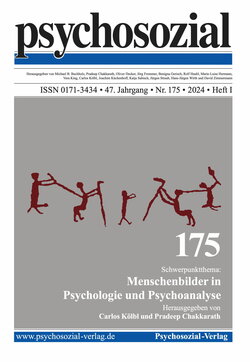19 Seiten, PDF-E-Book
Erschienen: März 2024
Bestell-Nr.: 26722
https://doi.org/10.30820/0171-3434-2024-1-45
abonnieren
Christina Hofmann
Cultivating the Powers of the Human Mind (PDF)
Das Klassenzimmer als Aushandlungsort psychologischer Menschenbilder zur Zeit des Kalten Krieges
Sofortdownload
Dies ist ein E-Book. Unsere E-Books sind mit einem personalisierten Wasserzeichen versehen,
jedoch frei von weiteren technischen Schutzmaßnahmen (»DRM«).
Erfahren Sie hier mehr zu den Datei-Formaten.
In diesem Artikel werden die menschheitsverbessernden Visionen US-amerikanischer Wissenschaftler*innen zur Zeit des Kalten Krieges untersucht, die neueste Erkenntnisse zum Menschen für den Schulunterricht der 1960er Jahre fruchtbar machen wollten. Vor allem Jerome Bruners kognitive Psychologie spielte dabei eine zentrale Rolle und sein ambitioniertes Grundschulprojekt Man: A Course of Study wird als spannungsreiches Aushandlungsfeld psychologischer Menschenbilder in mehrfacher Hinsicht präsentiert: Das Curriculum ist nicht nur durch unterschiedliche humanwissenschaftliche Perspektiven geprägt, bei deren Aufeinandertreffen Synergien wie Reibungen entstanden, sondern offenbart auch die Vielgestaltigkeit von Bruners eigenen Annahmen zum Menschen.
Abstract:
This article examines the aspirations of American scientists to advance humankind by reforming schools with state-of-the-art knowledge about human beings during the Cold War. The focus lies primarily on Jerome Bruner’s cognitive psychology which played a significant role in the scholarly informed curriculum reform of the 1960s. Bruner’s ambitious educational project Man: A Course of Study is presented as an action field to negotiate psychological conceptions of human beings in several respects: not only is the curriculum shaped by various perspectives from disciplines which concern the human experience, giving rise to both synergies and tensions; it also reveals the complexity of Bruner’s own assumptions about human beings.
Abstract:
This article examines the aspirations of American scientists to advance humankind by reforming schools with state-of-the-art knowledge about human beings during the Cold War. The focus lies primarily on Jerome Bruner’s cognitive psychology which played a significant role in the scholarly informed curriculum reform of the 1960s. Bruner’s ambitious educational project Man: A Course of Study is presented as an action field to negotiate psychological conceptions of human beings in several respects: not only is the curriculum shaped by various perspectives from disciplines which concern the human experience, giving rise to both synergies and tensions; it also reveals the complexity of Bruner’s own assumptions about human beings.
Carlos Kölbl & Pradeep Chakkarath S. 5–14Editorial (PDF)
Was ist der Mensch? Zur Bedeutung von Menschenbildern in Psychologie und PsychoanalyseWalter HerzogS. 15–29Kann man Psychologie weitergeben? (PDF)
Die Alltagspsychologie als MenschenbildSenta BrandtS. 30–44Das starke Subjekt und seine Feinde (PDF)
Das Menschenbild und Handlungsmodell der Positiven PsychologieChristina HofmannS. 45–63Cultivating the Powers of the Human Mind (PDF)
Das Klassenzimmer als Aushandlungsort psychologischer Menschenbilder zur Zeit des Kalten KriegesAnup DharS. 64–81Picture of the Human in Psychoanalysis (PDF)
Between Practical Philosophy and Medieval SahajiyaOlaf Jann & Veith Selk S. 85–95Moralische Gentrifizierung (PDF)
Jörg R. Bergmann & Jürgen Straub S. 99–100Begegnungen, Beziehungen, Analysen (PDF)
Zur Erinnerung an Ulrich Streeck (* 12. März 1944, † 24. April 2023)Martin AltmeyerS. 101–103Das Selbst und die Anderen (PDF)
Eine Lebenswelt voller Sozialbeziehungen im Blick eines PsychoanalytikersBrigitte BootheS. 104–114In Wechselwirkung verbunden (PDF)
Resonanz und AntwortAnssi PeräkyläS. 115–119Blickkontakt, Körperwissen, Antworten (PDF)
Zum interdisziplinären Denken Ulrich Streecks
Was ist der Mensch? Zur Bedeutung von Menschenbildern in Psychologie und PsychoanalyseWalter HerzogS. 15–29Kann man Psychologie weitergeben? (PDF)
Die Alltagspsychologie als MenschenbildSenta BrandtS. 30–44Das starke Subjekt und seine Feinde (PDF)
Das Menschenbild und Handlungsmodell der Positiven PsychologieChristina HofmannS. 45–63Cultivating the Powers of the Human Mind (PDF)
Das Klassenzimmer als Aushandlungsort psychologischer Menschenbilder zur Zeit des Kalten KriegesAnup DharS. 64–81Picture of the Human in Psychoanalysis (PDF)
Between Practical Philosophy and Medieval SahajiyaOlaf Jann & Veith Selk S. 85–95Moralische Gentrifizierung (PDF)
Jörg R. Bergmann & Jürgen Straub S. 99–100Begegnungen, Beziehungen, Analysen (PDF)
Zur Erinnerung an Ulrich Streeck (* 12. März 1944, † 24. April 2023)Martin AltmeyerS. 101–103Das Selbst und die Anderen (PDF)
Eine Lebenswelt voller Sozialbeziehungen im Blick eines PsychoanalytikersBrigitte BootheS. 104–114In Wechselwirkung verbunden (PDF)
Resonanz und AntwortAnssi PeräkyläS. 115–119Blickkontakt, Körperwissen, Antworten (PDF)
Zum interdisziplinären Denken Ulrich Streecks

